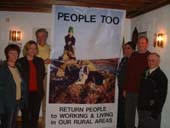Week commencing Monday 31st January 2005
Well, it’s Tuesday night and I’ve just got
back from my two day trip to Dumfries and Galloway. I’m seldom in that
part of the country, but when I am I marvel at how lovely it is. I was
really lucky with the weather - winter sun – and driving around was a
pleasure.
I learned a lot during my trip. My first
stop was Dumfries & Galloway Housing Partnership – an organisation which
took over all the Council stock – looking at their regeneration plans
and learning about the particular difficulties of servicing the large
and diverse area covered by them. I then drove to St. John’s Town of
Dalry for a really well attended public meeting about housing. I have
known for some time that there are huge issues in Galloway about the
lack of housing for local folks, particularly the younger generation,
and the ongoing impact on rural communities. It’s only when you meet the
people directly affected though that you realise just how disheartening
it must be to want to live where you feel you belong, but find it
impossible. Local communities have taken up the cause though and
Dumfries and Galloway Small
Communities Housing Trust, the Scottish Rural Property Business
Association, Glenkens Affordable Housing Group and Glenkens Community
Council all had representatives at the meeting.

I loved the poster that one
of the groups brought along – it just summed up what has to happen –
RETURN PEOPLE TO WORKING AND LIVING IN OUR RURAL AREAS.
On Tuesday I visited Crichton Campus in
Dumfries which in educational terms is allied with both Glasgow and
Paisley Universities, and ties in with Hamilton’s Bell College Nursing
programme. There is also a ‘business park’ on site. The commitment of
all – staff and students, management board members – was obvious and
again, the philosophy of enabling local people to study close to home,
so practical and sensible. This valuable resource must be retained and
expanded for the benefit of Galloway. I wish them much good fortune in
their funding quest.
Wednesday morning – Communities Committee –
more on the proposed Charities legislation, this time grilling the
Minister. So, next step is for our Committee to prepare its Report, and
then that will go to Parliament along with the Executive’s proposals for
the Stage 1 debate.
The Cross Party Group on International
Development met at lunchtime to discuss the ‘Make Poverty History’
campaign. It is crucial that we all pull together on this; in our
Parliament, in Wales and North of Ireland, and of course in the UK. It’s
especially relevant to us this year though because of the G8 meeting in
Gleneagles in July and the UK Presidency of the European Union later in
the year. Gleneagles is in my colleague, Roseanna Cunningham’s Perth
constituency, and she’s been speaking with lots of local groups and
individuals about the disruption that’s likely to be caused. Most folk
though are saying that they are willing to put up with the disruption as
long as some good comes out of the G8 meeting. Rosie has put down a
motion in Parliament to reflect that feeling and I hope that it’s
‘signed up to’ across the political parties:
S2M-2372 # Roseanna Cunningham: G8
Summit—That the Parliament
recognises that the G8 Summit being held in Gleneagles, Perthshire, from
6 to 8 July 2005, offers an opportunity for Scotland to debate issues
related to international aid, trade justice and debt relief;
acknowledges that there will be inconvenience and disruption to many
communities as a result of hosting this summit, and is of the view that
such disruption can only be justified if the representatives of those
countries with the greatest economic power arrive at decisions which
will allow countries in the developing world to grow and prosper, at
their own pace and in their own way, by the provision of
appropriately-targeted aid, debt relief and a just framework of trade
rules.
Another Cross Party Group Meeting at
teatime, after Chamber, to discuss the current situation in Palestine.
We were addressed by Afif Safieh, Representative of the Palestinian
Delegation to the UK, and as ever the discussion was enlightening. Mr.
Safieh is ever optimistic that justice will eventually come for the
Palestinian people – I guess that it’s only hope which keeps you going
when all else seems to be against you.
Thursday morning and the debate on
Scotland’s economy led by the SNP’s Jim Mather – the International
Institute for Management Development competitiveness ranking places
Scotland 36th against the UK's 22nd place out of
60 nations and regions and we have a projected loss of 550,000
economically active people by 2043. It seems very obvious to me that
steps have to be taken to secure Scotland’s future, and I really can’t
understand why others feel we can just carry on as a junior partner in
the UK when we see other small nations, without our natural resources,
steaming ahead to the benefit of their citizens. Still, persevere,
persevere, persevere – some day they’ll have to admit we’re right, and
the sooner the better for us all.
Two interviews at lunchtime – one by a
student doing her dissertation on the negative press/media portrayal of
asylum. I’m always glad to hear students doing work like this – the more
people who talk about such issues the better. The reality is on this
particular topic though, that sadly the negative picture first emerges
from Government and its main opposition at Westminster – the language
they use for example, using the terms asylum seekers, illegal
immigrants, economic migrants, bogus applicants, interchangeably. Not
all the press are guilty of falling for this guile though – both the
Herald and the Sunday Herald paint a fairer picture, the Sunday Herald
recently highlighting the disgusting practice of taking ill asylum
seekers from Dungavel Centre to hospital in handcuffs. I’m trying to
find out from the Executive on what grounds this can be justified – no
answers yet.
The other interview was a profile piece for
Holyrood Magazine – dreading this coming out because you never know just
how you will be portrayed, and I am aware that I tend to babble on a bit
(as any reader out there will have realised a long time ago!).
Following a rally with the ‘Save our
Regiments’ campaign, I managed to get Question No. 1 in the health
section in the afternoon! It was about the effect of private finance
initiatives and public-private partnership costs on the budgets of
national health service boards. I don’t think I got an answer though!
Judge for yourself:
Linda Fabiani (Central Scotland)
(SNP): To ask the Scottish
Executive what effect increasing private finance
initiatives/public-private partnership costs have on the budgets of
national health service boards. (S2O-5214)
The Minister for Health and
Community Care (Mr Andy Kerr):
PFI contracts are signed on the basis of an
approved business case and affordability is assessed over the period of
the contract. The unitary payments that are made to contractors reflect
not only the construction of buildings, but ongoing maintenance over the
life of the contract. The Executive is continuing to increase
dramatically the level of infrastructure investment in NHS Scotland.
This is not simply about PPP. Our public capital budget has risen from
£136 million in 1997 to £350 million this year. The annual capital
budget by 2007-08 will be £530 million. In 2004-05, the unitary payments
for signed NHS Scotland PFI/PPP contracts is just over £100 million.
That represents 1.26 per cent of forecast revenue expenditure for NHS
boards. Those costs have been published within the draft budget 2005-06.
Linda Fabiani:
Will the health minister acknowledge the
ratchet effect of fixed-payment PFI/PPP projects on a tightening budget?
Will he also acknowledge the Minister for Finance and Public Service
Reform's confirmation that internal rates of return to shareholders in
those project companies are between 13 per cent and 16 per cent? In
particular, however, will he undertake to investigate why delivering
such revenue streams for the private sector has become a function of the
health service?
Mr Kerr:
What escapes the member's attention is that
we need buildings in the health service to provide services to our
communities; therefore, whatever way we build our hospitals, they will
be a key driver in any NHS budget. What PFI/PPP does for us is provide
additional capacity that otherwise would not be available. I say to the
550,000 patients in Scotland who have benefited from Hairmyres hospital,
Wishaw general hospital and Edinburgh royal infirmary that they would
not have had those hospitals under the policies of Linda Fabiani's
party.
Thursday evening spent catching up on
constituency cases – generally the health service again, along with many
people worried about the imminent changes to public service pensions.
In Hamilton Friday morning at Bell College.
I was accompanied by Alyn Smith MEP, and we were making a presentation
to students - “Free Trade or Fair Trade”. We had a really lively
discussion, the first of many I hope. I find that everywhere I go people
are becoming much more aware of the Trade Justice and Reduce the Debt
campaigns. The churches have been plugging away at these agenda for
years and the movement is becoming much more broadly based. All for the
good.
Friday afternoon spent running around doing
last minute preparations for East Kilbride SNP’s Burns Supper in the
evening – ice, something for the vegetarians, raffle tickets, type up
bar price list, biographies of the speakers. All went well, although I
did cause a bit of hilarity in my role as Chairperson in announcing the
‘Falkirk Grace’ instead of the ‘Selkirk Grace’ – can’t get away from
work! My friend Angela was in charge of the photographs and I had hoped
to print some here of that very august gathering. Don’t know what she
did though, but the only one that came out was a picture of Angela
herself, so in revenge I have decided to print it! I don’t know why she
has a pineapple on her head!

Had a great time when we got home – I always
enjoy the Burns Supper in East Kilbride, but I enjoy just as much the
fact that so many friends come from a distance and stay over at
Strathaven – it’s like a bunkhouse with folk sleeping everywhere and
chaos at breakfast time, but it’s marvellous craic.
Slept late on Saturday as you can imagine,
and in the evening waved off our friends and headed off to another Burns
Supper in the Mill in Strathaven, run by the Arts Guild. Again, a
smashing time. The Provost of South Lanarkshire was in attendance,
giving the vote of thanks. He really is a grand ambassador for the
county and it meant a lot to the Guild that he came along.
Sleepy Sunday – didn’t do much except clear
the detritus that we brought home from Friday night’s festivities.
Crockery to be returned in the morning, boxes of glasses to be washed
and stored away again until next time, broth to eat, alcohol consumption
to estimate. Thankfully, unlike previous years, we didn’t have much
haggis left over – we seem after six years to have calculated the amount
of haggis, neeps and tatties just right. Got to work on calculating the
oatcakes and cheese now – we’ve got thousands of oatcakes and pounds of
cheese to be distributed so as they’re not wasted!
Back to work on Monday.
Linda.fabiani.msp@scottish.parliament.uk
6.2.05 …

